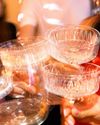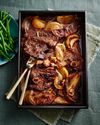
Once upon a time, long before Uber Eats and microwaves, we humans hunted protein-rich food and gathered roots and berries. If they were sweet, we’d fill our stomachs. If they were sour, we’d keep away. We had finely-tuned survival instincts so we could bolt if we sensed a tiger snake nearby. We formed strong social bonds because isolation meant death. It wasn’t all strawberries and naps in the sun, but life was simpler.
Historian Yuval Noah Harari says it’s likely our prehistoric ancestors enjoyed a far easier and, arguably, happier existence. Yes, we had to worry about lions. But we only had to worry about lions. We “didn’t have to deal with automobile accidents or industrial pollution,” he writes in his book Sapiens: A Brief History of Humankind. There were “no floors to polish, no nappies to change and no bills to pay”.
There was no need for sleeping pills, digital detoxes or deep-tissue massages. All our meals were organic, free-range and non-GMO. We lived in mobile tribes with few possessions and little pressure, far from skyscrapers, fast food, traffic and 24-hour news cycles. Our modern world “gives us more material resources and longer lives than those enjoyed by any previous generation, but it often makes us feel alienated, depressed and pressured,” Dr Harari explains.
Many behavioral psychologists who have spoken to The Weekly over the years about the malaise, insomnia, exhaustion and anxiety that plague our society agree: The gap between human nature and our contemporary environment is harming our mental and physical health.
This story is from the {{IssueName}} edition of {{MagazineName}}.
Start your 7-day Magzter GOLD free trial to access thousands of curated premium stories, and 9,000+ magazines and newspapers.
Already a subscriber ? Sign In
This story is from the {{IssueName}} edition of {{MagazineName}}.
Start your 7-day Magzter GOLD free trial to access thousands of curated premium stories, and 9,000+ magazines and newspapers.
Already a subscriber? Sign In

Hitting a nerve
Regulating the vagus nerve with its links to depression, anxiety, arthritis and diabetes - could aid physical and mental wellbeing.

Take me to the river
With a slew of new schedules and excursions to explore, the latest river cruises promise to give you experiences and sights you won’t see on the ocean.

The last act
When family patriarch Tom Edwards passes away, his children must come together to build his coffin in four days, otherwise they will lose their inheritance. Can they put their sibling rivalry aside?

MEET RUSSIA'S BRAVEST WOMEN
When Alexei Navalny died in a brutal Arctic prison, Vladimir Putin thought he had triumphed over his most formidable opponent. Until three courageous women - Alexei's mother, wife and daughter - took up his fight for freedom.

The wines and lines mums
Once only associated with glamorous A-listers, cocaine is now prevalent with the soccer-mum set - as likely to be imbibed at a school fundraiser as a nightclub. The Weekly looks inside this illegal, addictive, rising trend.

Jenny Liddle-Bob.Lucy McDonald.Sasha Green - Why don't you know their names?
Indigenous women are being murdered at frightening rates, their deaths often left uninvestigated and widely unreported. Here The Weekly meets families who are battling grief and desperate for solutions.

Growing happiness
Through drought flood and heartbreak, Jenny Jennr's sunflowers bloom with hope, sunshine and joy

"Thank God we make each other laugh"
A shared sense of humour has seen Aussie comedy couple Harriet Dyer and Patrick Brammall conquer the world. But what does life look like when the cameras go down:

Winter baking with apples and pears
Celebrate the season of Australian apples and pears with these sweet bakes that will keep the midwinter blues away.

Budget dinner winners
Looking for some thrifty inspiration for weeknight dinners? Try our tasty line-up of low-cost recipes that are bound to please everyone at the table.